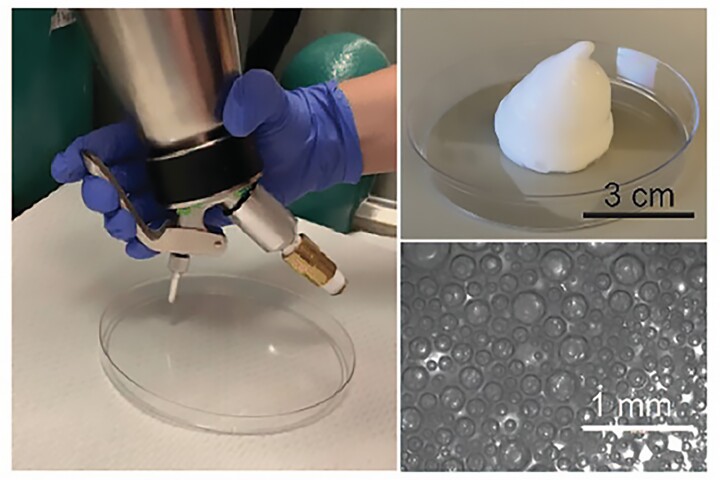University of Iowa
-
Using a popular culinary technique, researchers have created a foam infused with carbon monoxide to boost the effectiveness of an experimental cancer therapy. The novel foam offers a promising approach to improving treatments for different cancers.
-
Using the same whipping siphon used in the culinary world, researchers have created a food-based foam that can be injected directly into tumors. The foam contains oxygen, which makes tumors more susceptible to chemotherapy and radiation treatments.
-
Along with their use in foods, soybeans have also been utilized as a source of graphene, a greener alternative to mulch, and an ingredient in longer-lasting tires. Now, they're additionally being used to extend the life of asphalt roads.
-
Researchers have uncovered the role of a liver hormone in alcohol addiction. Monkeys with a strong alcohol preference drank far less after they were given a synthetic version of the hormone, opening new potential treatments for alcohol addiction.
-
A research group at the University of Iowa has built what is described as a "remote control" for diabetes management that uses electromagnetic fields (EMFs) to reduce blood sugar levels and improve the body’s response to insulin.
-
For some time now, paleontologists have known of a giant prehistoric crocodylian known as Deinosuchus. Now, however, it has been confirmed that the reptile was capable of killing and eating dinosaurs – with some help from its "banana-sized" teeth.
-
Scientists recently discovered the liver releases a hormone to suppress consumption of sweet foods once a person has consumed high volumes of sugar. A new study has homed in on exactly how this mechanism works, and where in the brain it takes place.
-
Exposure to sustained loud noise often results in hearing loss. But now, biologists are testing drugs they call “chemical earmuffs” in mice, which could prevent hearing loss without affecting the volume or quality of sound.
-
Scientists have uncovered what may have been the “last stand” of Homo erectus. Previously thought to have disappeared about 300,000 years ago, Homo erectus could have survived in Indonesia until as recently as 108,000 years ago.
-
As unassuming as it might look, the unisexual Ambystoma salamander has been breaking evolution’s rules for millions of years to establish a girls-only lineage. A new study sheds light on the genetic balancing act these lady salamanders perform to survive and thrive.
-
ScienceResearchers from the University of Iowa and United States Geographical Survey (USGS) have developed a method of using satellite and GPS data to characterize earthquake fault lines in real time, helping to deliver aid more accurately and with greater speed than current systems allow.
-
Scientists at the University of Iowa have created an implantable collagen patch seeded with particles containing synthetic DNA, that instructs a patient's own cells to produce the protein that leads to bone growth.
Load More











